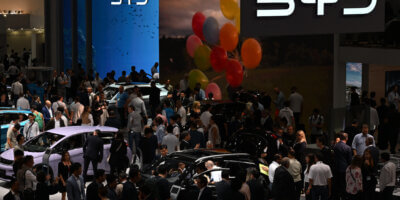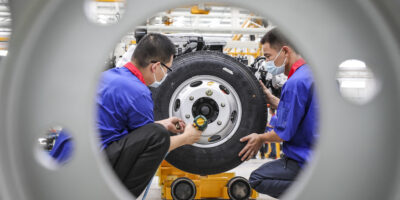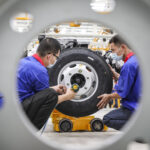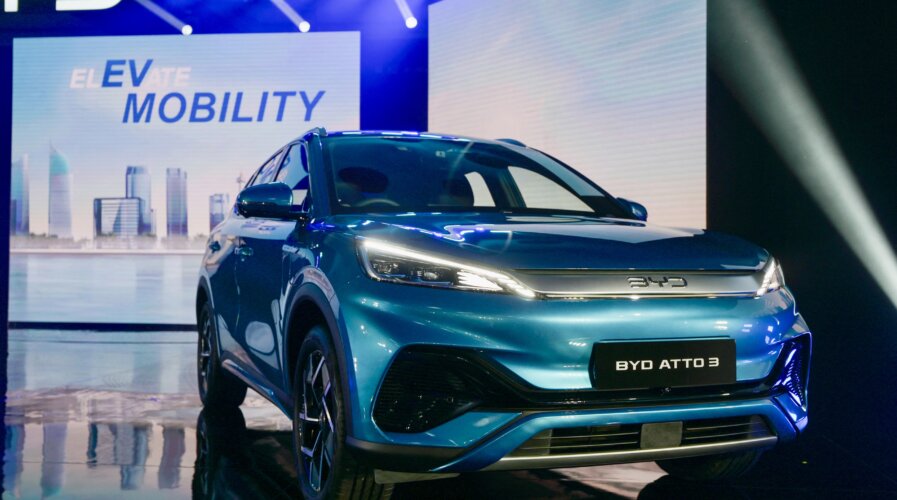
Newly launched BYD Atto 3 is displayed during the launch of the Chinese-made BYD brand in Jakarta, on January 18, 2024. (Photo by BAY ISMOYO/AFP).
BYD has big EV plans for Indonesia
- BYD has just announced that it will be investing US$1.3 billion in an EV factory in Indonesia.
- The Chinese EV maker marked its entry into Indonesia with the sale of 3 models.
- BYD recently overtook Tesla in terms of number of EVs sold globally.
Indonesia is one of the largest markets for EVs in Southeast Asia, with a population of over 270 million people and a growing demand for mobility. The Indonesian government has set ambitious targets to promote the adoption of EVs, such as having 2.5 million EVs on the road by 2025, including 400,000 fully electric cars, and building 2,400 charging stations across the country.
The government also offers various incentives and regulations to support the EV industry, such as tax reductions, subsidies, import waivers, and emission standards. However, there are also some challenges and barriers that hinder the development of EVs in Indonesia, such as the lack of infrastructure, the high cost of batteries, the low consumer awareness and preference, the limited domestic production and supply chain, and the uncertain policy environment.
In 2023, Indonesia’s President Joko Widodo met with Tesla CEO Elon Musk. The President had hoped to convince Musk to set up a Tesla manufacturing plant in Indonesia. While both of them felt the meeting was positive, Tesla has yet to make any major announcements about setting up a manufacturing facility in the country.
But this did not hamper the country’s ambition of becoming a regional EV hub. The country realized that it is important to foster collaboration among various stakeholders, especially between the government and the private sector, academia, civil society, and international partners to create a conducive ecosystem for EVs in Indonesia.
In 2023, Indonesia launched a list of incentives for consumers and businesses to buy electric cars and buses to speed up the shift from fossil fuel-based energy to electric energy. They offered cash benefits to consumers who bought electric motorcycles made in Indonesia, along with several other attractive offers. According to a PWC survey, most respondents (56%) were primarily aware of the lower taxes offered on buying an EV, followed by 39% who were aware of the plan to build charging stations in remote areas.
The survey also showed that hybrid or electric car adoption may take longer than expected due to 33% of participants choosing to buy fossil fuel cars over the course of the next year, in comparison to 13% of consumers who are hoping to buy a hybrid vehicle, or the 21% in the market for an electric car. In the long term though, 45% of respondents said they hope to buy an electric car in the future, compared to 34% still holding onto fossil fuel-based cars.
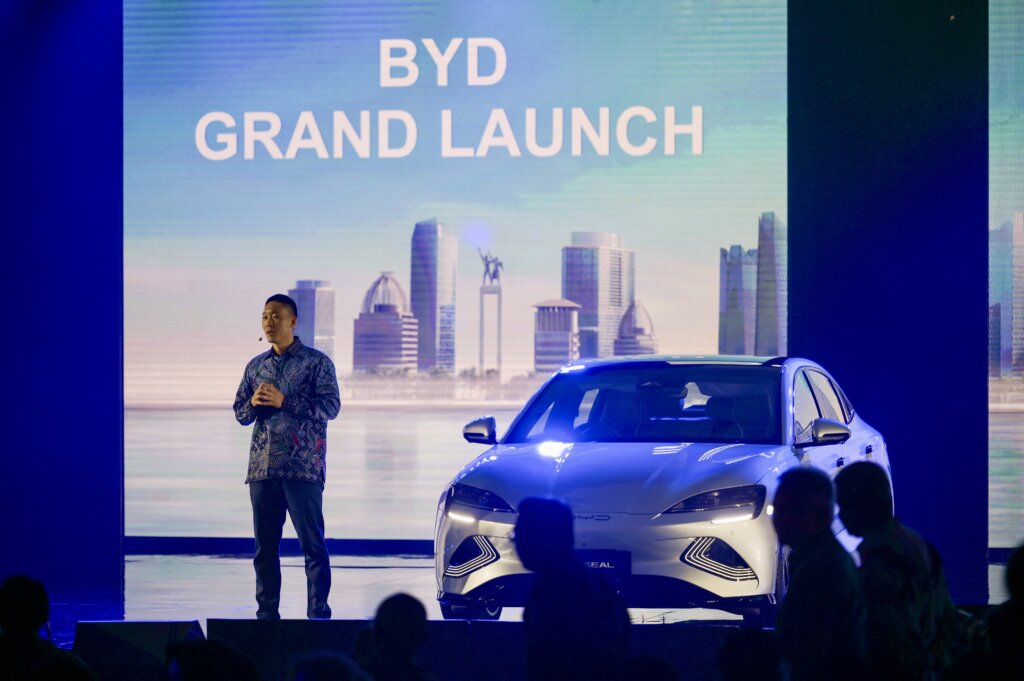
Nathan Sun, Operation Director BYD Motor Indonesia, briefs journalists in Jakarta on January 18, 2024, during the launch of the Chinese-made BYD brand and at the same time introduced three types of battery-powered vehicles. (Photo by BAY ISMOYO/AFP).
BYD plans a big EV journey in Indonesia
While it may be a while before Tesla commits to Indonesia, Chinese EV maker BYD is making the most of the situation. BYD has just announced that it will be investing US$1.3 billion in an EV factory in Indonesia.
The Chinese carmaker also unveiled three new battery models for sale, becoming Indonesia’s biggest EV brand. The new plant is the company’s second in the region after Thailand and its sixth plant outside of China. The Chinese carmaker also overtook Tesla in EV sales last quarter, showcasing the brand’s strength globally against Tesla’s humiliating 2 million vehicle recall in the US.
BYD is also the leading EV brand in Southeast Asia. The company continues to report record-breaking sales with a strong dominance in Thailand and other ASEAN markets. Chinese automaker Wuling Motors’ Air EV and the Ioniq 5 from South Korea’s Hyundai Motor were the two best-selling battery electric cars in Indonesia last year.
According to a report by Reuters, BYD’s Indonesia president, Eagle Zhao, said the company aimed for the same market-leading position in Indonesia that it had achieved globally. The company has been offering electric buses and taxi fleets through local Indonesian partners and said it would now also start selling the Dolphin hatchback, the Atto 3 sport utility vehicle and the Seal sedan.
On November 24th, 2023, BYD achieved a historic milestone as its 6 millionth new energy vehicle rolled off the production line at the Zhengzhou factory. Having surpassed the 5 millionth to the 6 millionth new energy vehicle in just three months, BYD’s rapid pace continued to establish new benchmarks in production and sales.
Currently, BYD has entered 58 countries and regions, and surpassed an accumulative sales of 200,000 units of passenger vehicles, with significant victories in the new energy vehicle market in Thailand, Brazil, and other locations.
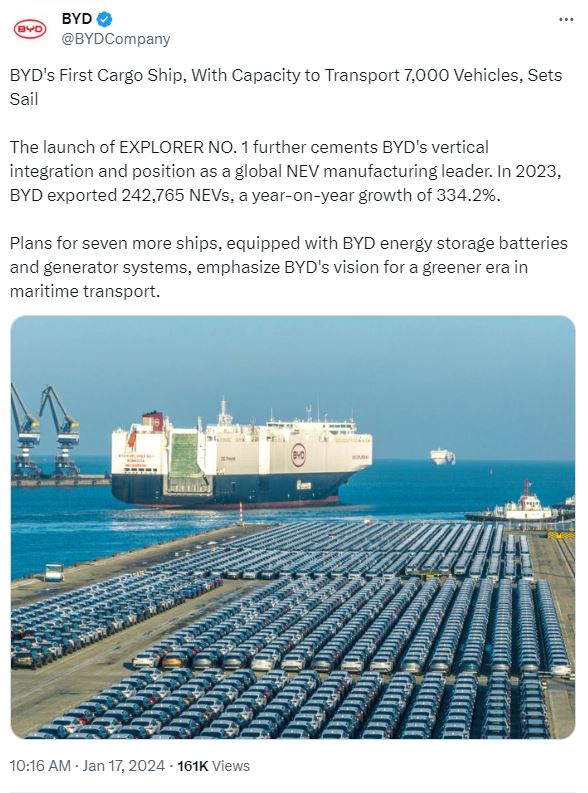
The Explorer No.1 can transport 7000 vehicles.
BYD continues to innovate
The Chinese EV carmaker also launched its first cargo ship. The Explorer No.1 can transport 7000 vehicles. Plans for seven more ships equipped with BYD energy storage batteries and generator systems, emphasize the company’s’s vision for a greener era in maritime transport.
At the recent 2024 BYD Dream Day event in Shenzen, BYD unveiled the Xuanji Architecture and Integrated Vehicle Intelligence. BYD’s Integrated Vehicle Intelligence strategy reshapes the concept of vehicle intelligence by considering the car in its entirety, effectively remolding intelligent vehicles with the self-developed Xuanji architecture.
The Xuanji architecture is an intelligent vehicular architecture that serves as both the brain and neural network of the vehicle, enabling an efficient blend of electrification and intelligence. This system seamlessly perceives changes in the internal and external environment of the car in real time. It consolidates information at millisecond level and feeds it back to the central “brain” for rapid decision-making. This system swiftly adjusts the state of the vehicle, significantly enhancing driving safety and comfort.
The company also announced its collaboration with technology company DJI, to create the world’s first vehicle-mounted UAS (unmanned aircraft system). Integrated onto a drone bay, it features intelligent storage, battery swapping, and charging management. By taking off and landing in one click, with high-definition, high-frame rate, and low-latency image transmissions, stunning aerial footage can be captured on any road trip.
READ MORE
- Safer Automation: How Sophic and Firmus Succeeded in Malaysia with MDEC’s Support
- Privilege granted, not gained: Intelligent authorization for enhanced infrastructure productivity
- Low-Code produces the Proof-of-Possibilities
- New Wearables Enable Staff to Work Faster and Safer
- Experts weigh in on Oracle’s departure from adland

